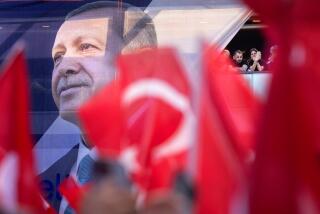Turkey Strains Ties With U.S. by Renewing Iraq Relations
- Share via
ANKARA, Turkey — Relations between the United States and Turkey, a fellow NATO member, have soured over Turkey’s surprise decision to upgrade diplomatic relations with Saddam Hussein’s regime in Iraq.
Baki Ilkin, Turkey’s ambassador to Washington, was summoned Sunday by State Department officials who “protested Ankara’s decision in the strongest possible terms,” said an official who asked not to be identified.
Turkey’s decision Saturday to exchange ambassadors with Iraq for the first time since the 1991 Persian Gulf War was a reaction to a U.S.-brokered agreement reached in Washington last week between leaders of the main rival Kurdish factions in northern Iraq.
Northern Iraq has been under Kurdish control since the United States and its allies declared a “no-fly” zone there at the end of the Gulf War. The Kurdish “safe haven” is enforced by U.S. and British warplanes based in southeastern Turkey.
Turkish officials were irritated by last week’s agreement because it calls for establishment of a Kurdish government in northern Iraq after elections scheduled there next summer.
Bulent Ecevit, the Turkish deputy prime minister, said Saturday that the agreement “has increased our concern that Iraq’s territorial division will be perpetuated.”
Washington has denied any plan to dismember Iraq. U.S. officials insist that reconciling the Iraqi Kurdish leaders, who have been locked in a bloody power struggle since 1994, is part of the Clinton administration’s policy of “containing” Hussein’s regime.
Signs of a U.S.-Turkish rift over Iraq surfaced in February, when Turkey announced its refusal to allow use of its bases for future U.S. military strikes against Iraq. Then in July, openly flouting U.N. sanctions against Iraq, Turkey legalized the sale of Iraqi fuel smuggled out of its southeastern neighbor by Turkish truck drivers.
Ecevit, who is openly anti-Western--as prime minister, he ordered Turkey’s 1974 military intervention in Cyprus--is said to be the driving force behind Turkey’s rapprochement with Iraq.
Turkey has long complained that a power vacuum in northern Iraq enables Turkish Kurdish guerrillas to stage attacks from there on military targets in Turkey. Moreover, Turkey fears that the emergence of a Kurdish entity along its border will whip up separatist sentiment among its own 12 million ethnic Kurds.
To assuage such fears, the United States has continued to overlook massive cross-border Turkish military operations against the Kurdish guerrillas in northern Iraq.
Last week’s agreement stipulated that both Iraqi Kurdish factions will prevent guerrillas from operating out of their territory. But Turkish officials have interpreted this to mean that Turkish troops will be discouraged from crossing into northern Iraq.
Some Turkish officials expressed concern Monday that Turkey will pay a price for its defiance. Washington’s support is regarded as crucial to Turkey’s goals of joining the European Union and becoming the main outlet for vast reserves of oil and natural gas exported from former Soviet republics in Central Asia.
“This is hardly the right time to be offending the Americans,” a Turkish official said.
More to Read
Sign up for Essential California
The most important California stories and recommendations in your inbox every morning.
You may occasionally receive promotional content from the Los Angeles Times.












